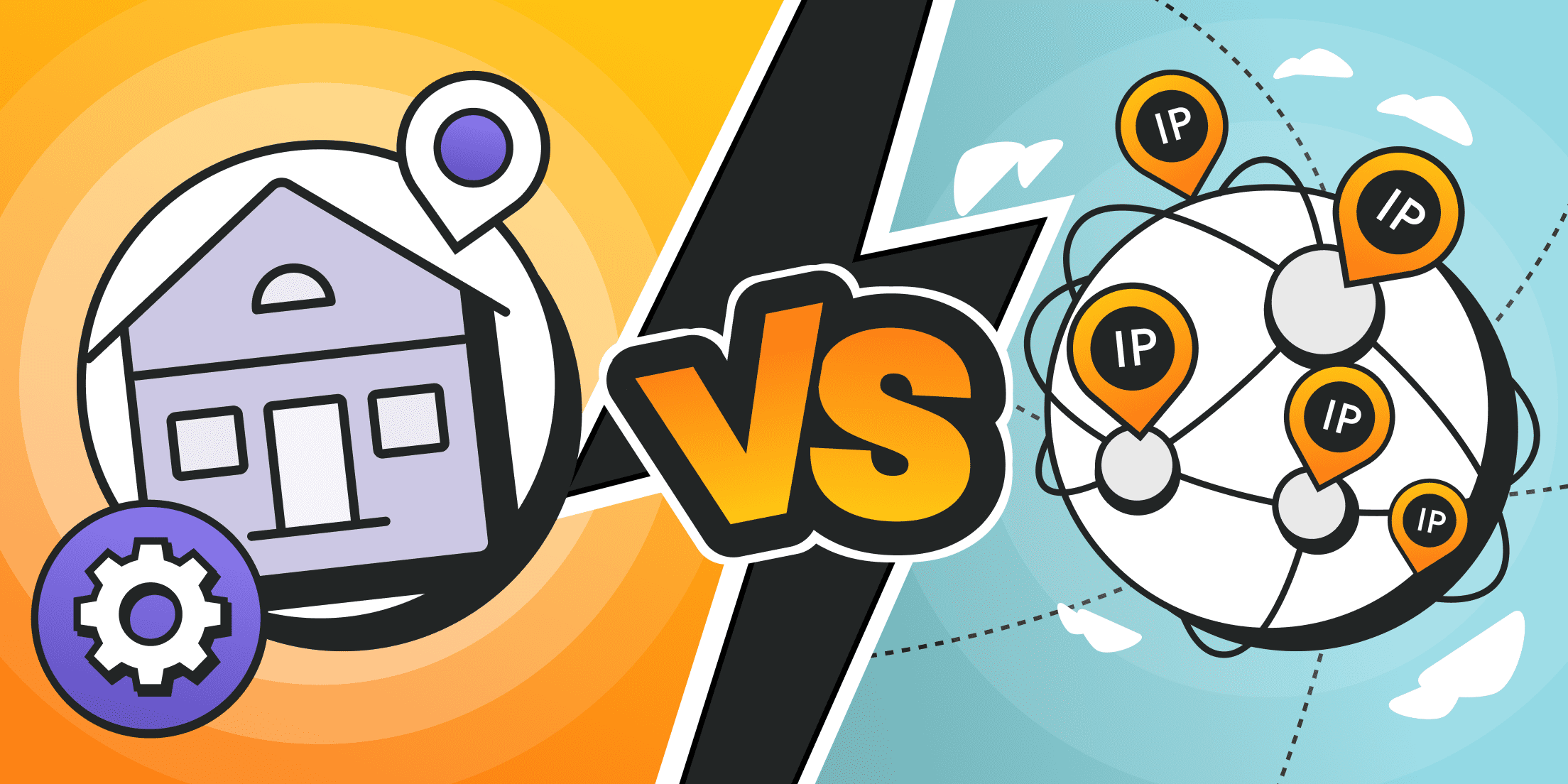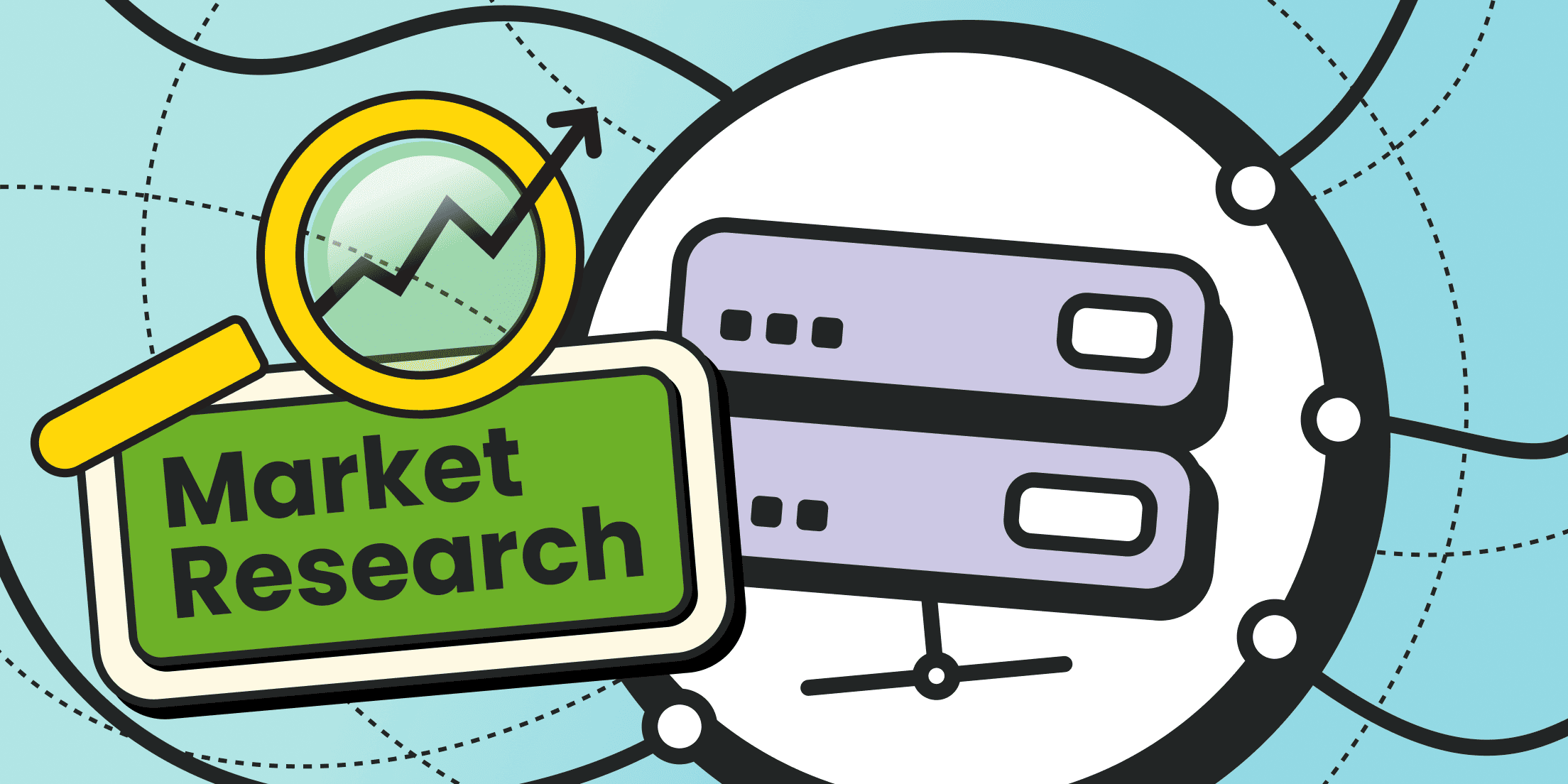Proxies are used for a wide range of tasks: website parsing, traffic filtering, creating alternative routes and bypassing blocks, load balancing, software and web service integration etc. However, each task has its own technical features and nuances. Therefore, specific types of proxies are suitable for each application scenario.
Some of the most common types of proxies include server (datacenter) proxies and residential (home) proxies.
In this article, we will discuss residential and server proxies and compare them in detail.
Brief Explanation of Proxies

Residential proxies, also known as home proxies, are proxy servers that operate on the basis of IP addresses of regular users, the ones provided by local ISPs (home internet providers).
Server proxies, also referred to as datacenter proxies, are proxy servers that operate using IP addresses owned by data centers and hosting providers.
At first glance, the difference may not seem significant, but that changes when you delve deeper into the details.
First, we'll discuss each proxy type separately to establish a clear understanding, and then we'll compare them with each other.
Residential Proxies

Residential proxies are proxies whose IP addresses are recognized as those of home internet providers. These IPs are typically assigned to residential households, hence the alternate name "home" proxies.
In most developed countries, there are few IPv4 addresses left. Therefore, local internet operators often rotate the available pool of IP addresses and provide their clients with dynamic, rather than static, addresses.
Rotating IPs can be "public" when each client receives a full-fledged IP address for the duration of their active session or "shared" when the provider assigns a single IP address to multiple clients simultaneously. In the latter case, reverse routing is managed through special hardware and software systems.
In any case, a static residential IP is a rarity. It usually comes as a premium service, letting a user keep a specific address for an extended period (a month or more).
How Residential Proxies Work
Technically, residential proxies can operate for a long time without interruption. In this case, however, a proxy provider needs to establish at least a nominal agreement with the user, allowing them to run a proxy server on their end and keep it active.
Less commonly, proxy providers themselves rent IP addresses from home internet providers. In this case, they can use these IPs as static addresses.
This scenario, however, is rare and not the most efficient, as residential proxies are appealing due to their ability to rotate.
Here's how rotating residential proxies work:
Situation 1: Residential Proxies with Direct Connection
A special software (proxy server) is installed on clients' devices, which is responsible for redirecting requests. Such software can communicate with the main server to report its availability, IP address, and free IP ports.
As a result, clients of the proxy provider receive a list of direct IP addresses and ports to which they can connect. Further rotation is managed by clients: they monitor the IP addresses assigned to them for bans and rotate them as they become unavailable (keeping in mind that residential proxies typically don't last long as the device owner can turn it off anytime).
Situation 2. Residential Proxies with Reverse Connection
This is a more convenient option. The client software (proxy server running on the user's device) not only reports its address and port number but also remains in constant contact with the main server.
Clients of the proxy provider get access to a proxy port. This is a special intermediate proxy that receives requests from a client and forwards them within the entire proxy network. The proxy port remains static. However, since the root proxy knows about all active residential proxy servers, it can manage their connections, balancing the load and selecting exit nodes based on specific logic, like a particular city or an association with an internet service provider.
Thus, a client connects to the proxy port, which in turn is part of a large proxy network. Requests are routed within this network and exit at the points determined by the super-proxy. The routing logic can be partially determined by the client and partially by the super-proxy algorithms.
Naturally, residential proxies with reverse connection are most interesting for business tasks (like web scraping, website monitoring, testing, etc.) because a client can change the exit nodes for each request to avoid blocks.
The larger the proxy network, the better, as this increases the number of IPs in specific locations, enhances targeting accuracy, etc.
Advantages of Residential Proxies
- IP addresses of real internet users significantly increase the trust level of protection systems;
- Local ISPs that own residential IP addresses provide stable and high-bandwidth connections, which are notably better than those provided by mobile networks;
- Under certain circumstances, residential proxies can function as static ones;
- The larger the residential proxy network is, the easier and more effective the rotation becomes. This enhances targeting quality, letting you choose the IP addresses not just from a specific country but from a particular region, state, or even city;
- Renting residential proxies is significantly cheaper in terms of traffic costs compared to renting mobile proxies;
- Residential proxies are perfect for business tasks, especially when there's a need to bypass blocks, increase anonymity and parallelize a large number of simultaneous requests to the same target website. This eventually helps save a lot of time and resources.
Disadvantages of Residential Proxies
- Residential proxies generally have slower connection speeds compared to dedicated servers. The equipment used by local ISP customers cannot compete with high-performance hardware servers. Moreover, servers typically have direct access to internet backbone channels, offering speeds measured in gigabits and terabits per second, far exceeding the few megabits per second that residential proxies usually offer;
- Even dedicated residential proxies are not available 100% of the time. There is always a chance of disconnection. Rotating residential proxies, in particular, tend to disconnect frequently and for extended periods (though this is mitigated by rotation);
- If you deal with multiple proxies, specialized tools are required for their management and replacement. For this very reason, we recommend using rotating proxies with reverse connection, where the super-proxy itself balances the load and promptly replaces addresses that drop out of the network.
Here is more detailed material about residential proxies (their specific features and application cases).
Datacenter Proxies

Datacenter proxies, also known as server proxies - are proxies, the IP addresses of which are identified as those belonging to companies that provide hosting services (renting computational power in data centers).
These companies may even have an official status as a Local Internet Registry (LIR).
Since data centers are crucial nodes of the internet network, they almost always have broad access channels. This typically involves direct connections to backbone internet channels or traffic exchange points - locations where multiple backbone channels converge.
How Datacenter Proxies Work
Server proxies operate within physical or virtual servers. A data center distributes the IP addresses available to its clients, similar to how residential internet providers assign IP addresses. However, there is a key difference—all connections and communications happen within the data center (DC). Additionally, client users—website visitors, clients of web services, online applications, etc. interact with the data center. Essentially, the data center primarily communicates with end users only and rarely directs traffic to external sites.
The basic working mechanism of server proxies is quite similar to that of residential proxies:
- Specialized software (proxy) is launched within a virtual or dedicated server;
- The datacenter proxy accepts requests and redirects them on its behalf.
Server proxies can operate independently or as part of a large-scale proxy network, including setups with reverse connection. In this configuration, they function similarly to rotating residential proxies.
Advantages of Datacenter Proxies
- Operation within dedicated (hardware) or virtual servers ensures high stability and quality isolation from other clients. Datacenter IP addresses are ideal for creating static proxies;
- Broad access channels (DC proxies often have direct access to backbone internet providers). That is why traffic is either unlimited or quite cheap;
- When configured with a large proxy network, datacenter proxies can function similarly to rotating residential proxies;
- Since data centers are available in all major cities, datacenter proxies can be geo-targeted and location can be changed as required.
Disadvantages of Datacenter Proxies
- The ownership of an IP address is easy to determine. Since datacenter IPs are not associated with end users, security systems often ban these proxies without consequence;
- There are specialized spam databases and blacklists that contain 99% of datacenter IPs. When connecting to a target site, it’s possible to find that the exit node is already blocked or frequently triggers CAPTCHA challenges. Solving CAPTCHAs significantly increases the cost of tasks like web scraping;
- To filter non-functional datacenter IPs, you need specialized software or access to a database of verified (clean/whitelisted) IPs;
- Since data centers are not available in every city, the quality of geo-targeting with datacenter proxies is relatively low, usually limited to the country level.
- Datacenter IP rotation is only possible if the provider has access to a large pool of IP addresses.
Note that our datacenter proxies have been thoroughly tested for quality, and we maintain a large pool of available addresses to ensure efficient rotation for every new request. This helped us bypass many of the common "cons" associated with datacenter proxies.
Froxy's datacenter proxies are the ideal solution for straightforward web scraping tasks. They make it possible to reduce costs due to lower traffic expenses.
Here is in-depth information on datacenter proxies (their special features and application cases).
Comparison: Residential Proxy vs Datacenter Proxy

Now, we have approached the most important part - the comparison. We'll break down the differences between datacenter and residential proxies based on key characteristics for clarity and better understanding.
Speed
Datacenter proxies have always been and will remain the fastest and most stable. This is because they operate on high-performance data center equipment. Additionally, access channels with mandatory redundancy (this infrastructure is what clients pay for in data centers) are available here as well.
Residential proxies can also ensure good speeds, especially if the channel is not involved in other activities. This is generally sufficient for streaming video and downloading heavy content.
It's important to note that real connection will completely depend on current node load. In other words, even backbone channels are limited and they can also be overloaded.
Anonymity and Security
The level of anonymity and security of proxy server connections largely depends on the settings and capabilities of the software used. However, there are nuances that depend on proxy type:
- Datacenter IPs are easier to track and block within general traffic. That is why their work may be associated with higher risks, including frequent CAPTCHA challenges and increased scrutiny from protection systems. Any suspicious activity or incorrect use will result in IP blocking;
- Residential proxies are less likely to be banned because the IP addresses belong to actual physical users who represent the potential target audience. Risks are much lower here.
Cost-Effectiveness
When considering the expenses associated with proxies, it's important to evaluate them in the context of the specific project.
On the surface, datacenter proxies appear significantly cheaper than residential ones. They offer high connection stability and good speeds. If the pricing is based on traffic usage, each gigabyte tends to be the most affordable.
If datacenter IPs are rotated with each request or on a timed basis, they will resemble the functionality of residential proxies. Isn’t it a good way to save costs?
If you need to parse a complex target site that can detect automated traffic, using datacenter proxies may lead to a high number of blocked connections or CAPTCHA challenges. Every solved CAPTCHA incurs additional costs, quickly increasing the project parsing budget. The traffic volume grows, as pages are loaded twice as long (once with the CAPTCHA and once without it), extending the parsing time.
In this case, the use of residential proxies seems more logical as the trust level to real “home” addresses is higher.
Conclusion: For simple websites and basic security systems, high-quality datacenter proxies (those already checked against spam databases) are a cost-effective choice. For more complex and large-scale projects, it makes sense to choose residential proxies.
Summary Comparison Table
|
Criteria |
Residential Proxies |
Datacenter Proxies |
|
Source of IP Addresses |
Local ISPs (residential/home users) |
Data centers and hosting providers |
|
Connection Speed |
Average (sufficient for heavy content) |
High |
|
Connection Stability |
Average (potential for disconnects) |
High (disconnects are unlikely) |
|
Trust Level by Protection Systems (Block Probability) |
High trust (low probability of being blocked) |
Low trust (high probability of being blocked) |
|
Traffic Cost |
Average |
Low (minimal investment) |
|
Targeting Accuracy |
Up to city and ISP level |
Up to large cities (usually to country level) |
|
Pool Size |
Up to several million |
Several thousand IPs |
|
Rotation Capability |
Yes |
Yes |
When to Use Residential vs Datacenter Proxies

So, when does it make sense to choose a datacenter vs residential proxies? Due to their characteristics, datacenter proxies - even with access to a large IP pool and rapid rotation - are best suited for simpler scraping tasks where there are no advanced protection mechanisms.
It's crucial to select that very proxy provider that can guarantee the quality of their IP addresses. Despite having a large pool, datacenter proxies can struggle with more complex websites "out of the box."
When advanced protection mechanisms are unavailable, though, rotating datacenter proxies are an ideal way to save on costs since their traffic is typically the most affordable.
Residential proxies are a better choice if you are dealing with a complex site equipped with advanced security systems. They are more expensive and potentially less stable than datacenter proxies, but offer a larger IP pool and more accurate targeting.
What’s more, they also enjoy a high degree of trust from anti-fraud algorithms because the IP addresses belong to real private users. Additionally, they make it possible to emulate user behavior in your scraping scripts, especially when using libraries like Chromepd and headless browsers.
Conclusion
Whatever the type of proxy server is, much will depend on the address quality. We recently launched a service for renting datacenter proxies where rotation and targeting can be configured almost like in residential proxies. Froxy offers a large pool of high-quality datacenter IPs. Any unused traffic can be carried over to the next month. As a result, you get a great opportunity to save on simple scraping tasks.
For comprehensive testing of our services, we offer a special trial package.




